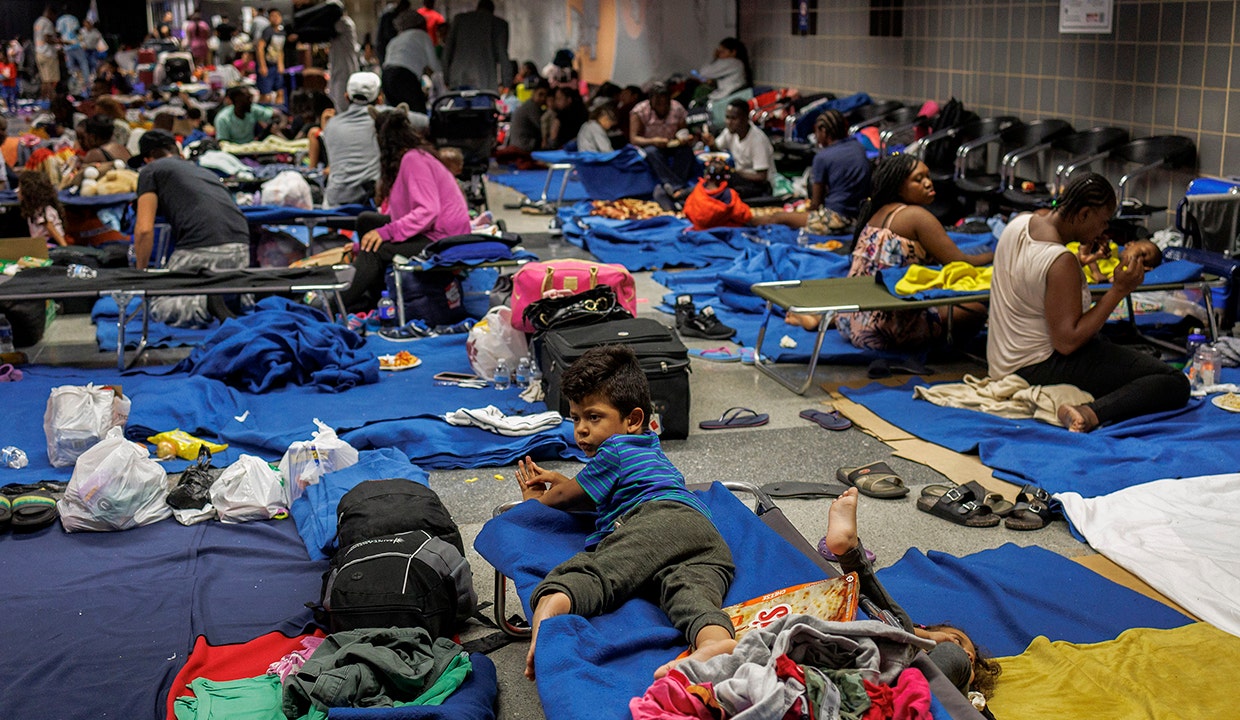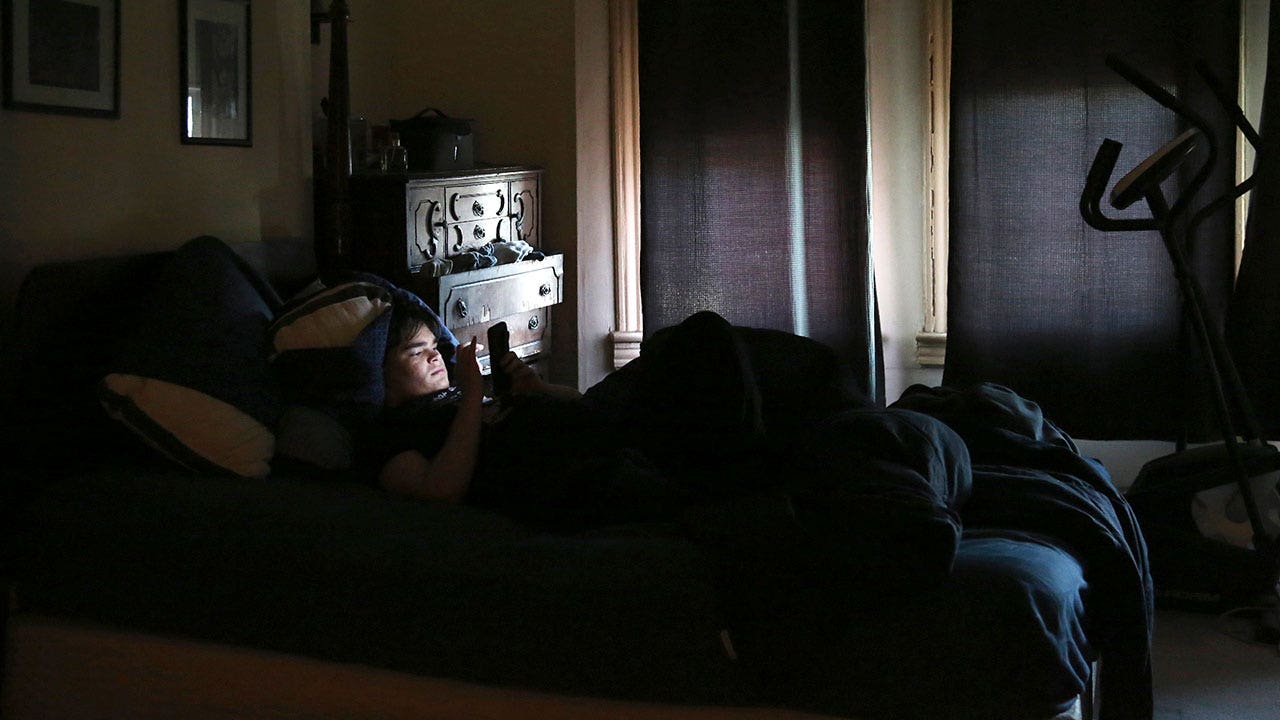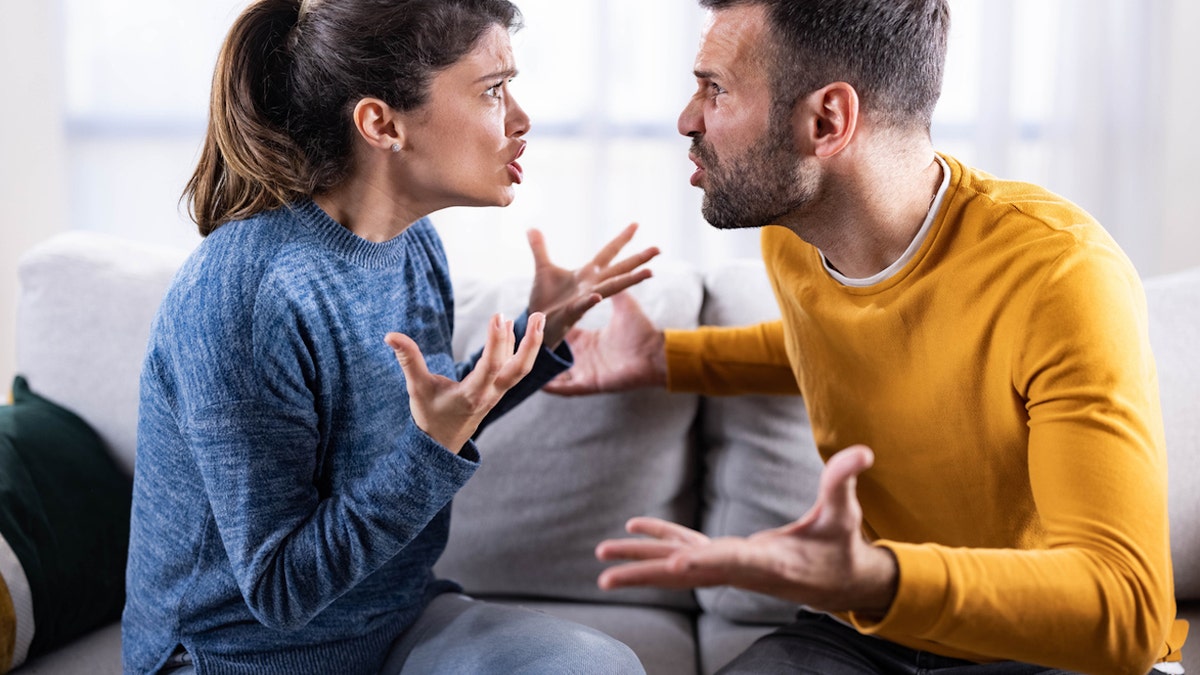Health
Second case of measles confirmed at Chicago migrant shelter

A second confirmed case of measles has been reported inside a Chicago migrant shelter, the Chicago Department of Public Health (CDPH) announced on Sunday.
These two reports are now the city’s first cases in five years, according to the CDPH.
The city reported an additional, unrelated measles case in Chicago on Thursday, as an increased number of measles cases have occurred around the country and the world in recent months.
The two cases of measles were identified in new young migrant child arrivals.
CHICAGO QUIETLY MOVES MIGRANTS FROM AIRPORTS AFTER SENATE COMMITTEE PROBE
Recently arrived migrants sit on cots and the floor of a makeshift shelter operated by the city at O’Hare International Airport on Aug. 31, 2023. ( Armando L. Sanchez/Chicago Tribune/Tribune News Service via Getty Images)
The health department reported that the first case has recovered and is no longer infectious, while the second is hospitalized in good condition.
“The majority of Chicagoans are vaccinated against measles and therefore are not at high risk, but we are strongly urging those who aren’t vaccinated to do so as soon as possible, new arrivals and all Chicagoans. It is by far the best protection against measles, which for the first time in years is in our city,” said CDPH Commissioner Olusimbo ‘Simbo’ Ige, MD.
City officials stated that residents of the Pilsen shelter who are vaccinated can enter and exit the facility at their own discretion. However, the unvaccinated and those who were just vaccinated in the last few days are being asked to quarantine for three weeks and watch for symptoms.
CHICAGO DEMOCRATS TURN AGAINST MAYOR JOHNSON ON MIGRANT ISSUE: ‘WE ASKED FOR IT’
“Because of how contagious measles is, I anticipate seeing more cases. Should you be exposed to someone who has measles, if you are not vaccinated you need to immediately quarantine and call a health provider. If you are not sure of your vaccination status, stay home and call your health provider as soon as possible,” Dr. Ige said.
The CDPH is urging all new arrivals and Chicago residents to be vaccinated against measles to protect themselves and the community.
“We have advised all unvaccinated and newly vaccinated residents of the quarantine period but some of those residents have left the shelter, and I want to acknowledge that,” Dr. Ige said. “That is why we so strongly advise the unvaccinated to get the vaccine and to immediately quarantine if you have had contact with anyone with measles.”
AMID FLORIDA MEASLES OUTBREAK, SURGEON GENERAL LETS PARENTS DECIDE WHETHER TO SEND UNVACCINATED KIDS TO SCHOOL

A migrant family in Chicago arriving on a bus from Texas (Fox News)
The health department added that no link has been identified between this recent case and a measles case in an Indiana resident who had visited Chicago last month. That case did not result in any secondary measles cases in Chicago residents, according to officials.
The symptoms of measles include rash, high fever, cough, runny nose, and red, watery eyes, according to the CDPH. After exposure, the symptoms can take seven to 21 days to appear.
The city of Chicago has taken in more than 36,000 migrants since they began arriving in 2022, according to the city’s new arrivals situational dashboard.

Health
Sleep experts sound alarm on late night screen time: How your phone could be sabotaging your rest

- More than half of Americans use their phones within an hour before bedtime, according to the National Sleep Foundation.
- Experts recommend shutting off devices earlier for better quality of sleep.
- Breaking the habit involves redesigning nighttime routines by replacing screen time with activities like reading or spending time with family.
Like many of us, Jessica Peoples has heard the warnings about excessive screen time at night. Still, she estimates spending 30 to 60 minutes on her phone before going to sleep, mostly scrolling through social media.
“Recently, I’ve been trying to limit the amount,” says Peoples, a discrimination investigator with the state of New Jersey. “I do notice that how much time I spend affects how long it takes to fall asleep.”
Over half of Americans spend time on their phones within an hour of going to sleep, according to a survey by the National Sleep Foundation. That’s the very latest we should shut off devices, experts say.
‘BED ROTTING’ IS SELF-CARE, SOME INSIST, BUT MENTAL HEALTH EXPERT SHARES WARNINGS ABOUT SOCIAL MEDIA TREND
The brain needs to wind down long before bedtime to get the restorative deep sleep that helps the body function, said Melissa Milanak, an associate professor at Medical University of South Carolina specializing in sleep health.
James Walter uses a phone at home in the Queens borough of New York, on April 7, 2021. Sleep scientists long ago established that insufficient sleep is linked with poor health outcomes, anxiety, obesity and several other negative effects. The research is equally conclusive that smartphones are particularly disruptive to the circadian clock that regulates sleep and other hormones. (AP Photo/Jessie Wardarski, File)
“You wouldn’t take a casserole out of the oven and stick it right in the fridge. It needs to cool down,” Milanak said. “Our brains need to do that too.”
Upending your bedtime routine may not be easy, but insufficient sleep has long been linked to anxiety, obesity and other negative outcomes. Research shows smartphones are particularly disruptive to the circadian clock that regulates sleep and other hormones.
“There are a million and one ways screens create problems with sleep,” said Lisa Strauss, a licensed psychologist specializing in cognitive behavioral treatment of sleep disorders.
The brain, she said, processes electric light — not just a smartphone’s much-maligned blue light — as sunshine. That suppresses melatonin production, delaying deep sleep. Even very little bright-light exposure in bed has an impact.
IT’S NOT JUST THE LIGHT THAT KEEPS YOU UP
Of course, doomscrolling through the news, checking emails or being tempted by ever more tailored videos on social media has its own consequences.
So-called “technostress” amps you up — possibly even triggering the brain’s flight or flight response. And algorithms designed to be engaging compel many social media users to scroll longer than they intended.
“Now it’s 30 minutes later, when you wanted to watch a couple videos and fall asleep,” Milanak said.
Though much of the scientific research on online media focuses on adolescents and young adults, Strauss said most of her clients struggling with insomnia are middle-aged. “People go down these rabbit holes of videos, and more and more people are getting hooked,” she said.
HOW TO BREAK THE HABIT
The issue is not just curtailing phone use in bed, but phone use at night. That means redesigning your routine, particularly if you use your phone as a way to decompress.
It helps to create replacement behaviors that are rewarding. An obvious contender is reading a physical book (e-readers are better than phones but still cast artificial light). Milanak also suggests using that hour before bed to take a warm bath, listen to a podcast, make school lunches for the next day, spend time with family or call a relative in another time zone.
“Make a list of things you like that never get done. That’s a great time to do stuff that doesn’t involve screens,” she said. Using a notepad to write down the to-do list for the next day helps keep you from ruminating in bed.
Do those activities in another room to train yourself to associate the bed with falling asleep. If there’s no other private refuge at home, “establish a distinct microenvironment for wakefulness and sleep,” Strauss said. That could mean sitting on the other side of the bed to read, or even just turning the other way around with your feet at the headboard.
Finally, sequester the phone in another room, or at least across the room. “Environmental control can work better than will power, especially when we’re tired,” she said.
WHAT IF STOPPING DOESN’T FEEL REALISTIC?
There are ways to reduce the harm. Setting the phone on night mode at a scheduled time every day is better than nothing, as is reducing screen brightness every night. Hold the phone far from your face and at an oblique angle to minimize the strength of the light.
Minimize tempting notifications by putting the phone on do not disturb, which can be adjusted to allow calls and messages from certain people — say, an ailing parent or a kid off at university — to go through. But none of these measures give you carte blanche to look at whatever you want at night, Strauss said.
She also recommended asking yourself why checking social media has become your late-night reward.
“Think about the larger structure of the day,” she said. Everyone deserves solitary moments to relax, but “maybe be more self-indulgent earlier so you have what you need.”
Health
Handling grief on Mother's Day, plus disease-fighting foods and heart health risks

Mother’s Day is a celebration for most, but it can be tough for those who have recently lost their mother. Experts share tips for handling the rush of emotions. (iStock)
MISSING MOM – The first Mother’s Day after losing a mom can be challenging. A mental health expert shares five tips for navigating grief during the holiday. Continue reading…
ABCs of BETTER ZZZs – A sleep hack circulating on social media could help you drift off faster at night. Plus, sleep experts share their own tips. Continue reading…
SEEING RED – A short temper could make you more susceptible to a heart attack, a new study suggests. Cardiologists weigh in on the risk. Continue reading…

Feeling angry for as little as eight minutes a day could raise your chances of experiencing a cardiac event, according to a new study. (iStock)
MOM ON A MISSION – A Pennsylvania mother is urging people to join the bone marrow registry to help her 10-year-old daughter, along with other patients waiting on donations. Continue reading…
ASK A DOC – ‘Is it safe to crack my back or neck?’ Doctors share cautions. Continue reading…
FOOD FOR THOUGHT – Eating at least three servings of yogurt per week could reduce the risk of a common disease, according to the FDA. Nutritionists share the benefits. Continue reading…

Yogurt that contains live, active cultures is a great way to get good bacteria in your diet, according to a nutritionist. (iStock)
SENIOR SCREENINGS – Health officials recommend mammograms for women aged 40 to 74 – but why are senior women excluded? Medical experts explain. Continue reading…
HOLY GUACAMOLE! – Eating more avocado could help prevent the risk of a common disease in women, some claim. Here’s what you should know. Continue reading…
VACCINE SHORTAGE – As a bacterial infection spreads globally, some public health officials are calling for a ramp-up of vaccine production. Continue reading…

Around 473,000 cases of cholera were reported to the World Health Organization in 2022, which was twice as many cases as the prior year. (iStock)
FOLLOW FOX NEWS ON SOCIAL MEDIA
YouTube
SIGN UP FOR OUR NEWSLETTERS
Fox News First
Fox News Opinion
Fox News Lifestyle
Fox News Health
Fox News Autos
Fox News Entertainment (FOX411)
DOWNLOAD OUR APPS
Fox News
Fox Business
Fox Weather
Fox Sports
Tubi
WATCH FOX NEWS ONLINE
Fox News Go
STREAM FOX NATION
Fox Nation
Health
The Oatzempic Diet Is Going Viral, but Does It Work? Here’s How To Tap Real Weight Loss Benefits

Sign Up
Create a free account to access exclusive content, play games, solve puzzles, test your pop-culture knowledge and receive special offers.
Already have an account? Login
Forgot your password?
Get back to the Sign In
Use left and right arrow keys to navigate between menu items.
Use escape to exit the menu.
-

 Politics1 week ago
Politics1 week agoThe White House has a new curator. Donna Hayashi Smith is the first Asian American to hold the post
-

 Politics1 week ago
Politics1 week agoStefanik hits special counsel Jack Smith with ethics complaint, accuses him of election meddling
-

 Politics1 week ago
Politics1 week agoAnti-Trump DA's no-show at debate leaves challenger facing off against empty podium
-

 News1 week ago
News1 week agoAs student protesters get arrested, they risk being banned from campus too
-

 News1 week ago
News1 week agoVideo: Police Arrest Columbia Protesters Occupying Hamilton Hall
-

 World1 week ago
World1 week agoNine on trial in Germany over alleged far-right coup plot
-

 World1 week ago
World1 week agoStrack-Zimmermann blasts von der Leyen's defence policy
-

 Politics1 week ago
Politics1 week agoNewsom, state officials silent on anti-Israel protests at UCLA
















